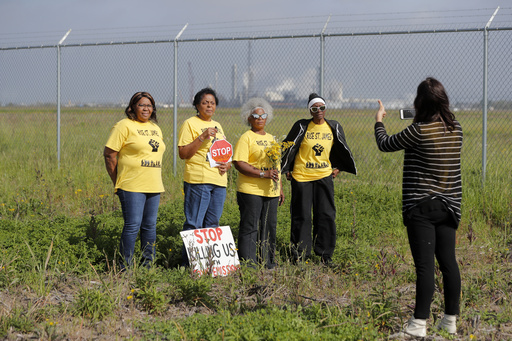
NEW ORLEANS, La. — For years, a genealogist has meticulously examined historical documents to confirm the identities of enslaved individuals she suspects are buried at the site of a proposed $9.4 billion plastics production facility in southeast Louisiana.
This initiative is part of an ongoing struggle by local community organizations, many representing descendants of enslaved individuals who toiled on plantations in St. James Parish and surrounding areas, aiming to halt industrial expansion and safeguard their cultural legacy.
Lenora Gobert’s comprehensive research, highlighted recently by the environmental group Louisiana Bucket Brigades alongside the community organization Inclusive Louisiana, uncovered the names of five enslaved individuals: Stanley, Harry, Simon, Betsy, and Rachel, who perished at a plantation now designated for a significant development by Formosa Plastics Group, a company based in Taiwan.
The ages of these individuals at the time of death ranged from 9 to 31 years. Gobert’s findings indicate that most of these individuals faced multiple transactions as plantation owners sought to use them for financial gain.
Limited archival material provides insights into their lives, primarily consisting of financial records that reveal how their owners exploited them to increase their wealth, Gobert noted. According to her studies, it is highly probable that the five individuals documented as having died at the plantation were interred on the grounds in accordance with plantation burial customs.
Research conducted by Forensic Architecture, a London-based agency, suggests there are hundreds more potential burial locations of enslaved people throughout St. James and adjacent parishes, identified through the analysis of maps and aerial photographs that revealed geographic anomalies indicative of possible graves.
A 2020 archaeological report, commissioned by Formosa, confirmed the presence of at least one site containing human remains on the property. However, the report clarified that determining the origins of these remains was inherently speculative and likely flawed.
Initially, Formosa claimed in a 2018 archaeological survey that no burial sites had been found but later reportedly delayed sharing information about the identified burial site for over a year, as activists have alleged.
Formosa contends that it has included information concerning the burial site and other suspected grave locations in the documentation provided during the project’s permitting process.
The company had considered the possibility of relocating the remains to another site, as indicated by public documents obtained by environmental advocates, yet community groups in St. James have fought to ensure the remains stay in their current location.
Janile Parks, director of community and government relations for FG LA L.L.C., a subsidiary of Formosa Plastics Group, asserted that the company has consistently prioritized the respectful preservation of the remains found on their property in St. James Parish. She mentioned that the company has taken steps to secure the burial site with fencing.
In a significant legal development in 2022, a judge from East Baton Rouge annulled the company’s air permits, citing concerns over anticipated pollution and the vital significance of the land believed to house the remains of enslaved individuals. However, this decision was later reversed in January by Louisiana’s First Circuit Court of Appeal, which reinstated the company’s permits.
Gobert emphasized that greater efforts are required by corporations, state agencies, and local governments to proactively recognize, safeguard, and honor these burial grounds.
“Why are the enslaved people so much less that they don’t deserve to have protection?” Gobert questioned, advocating for a more sensitive approach to this critical issue.
